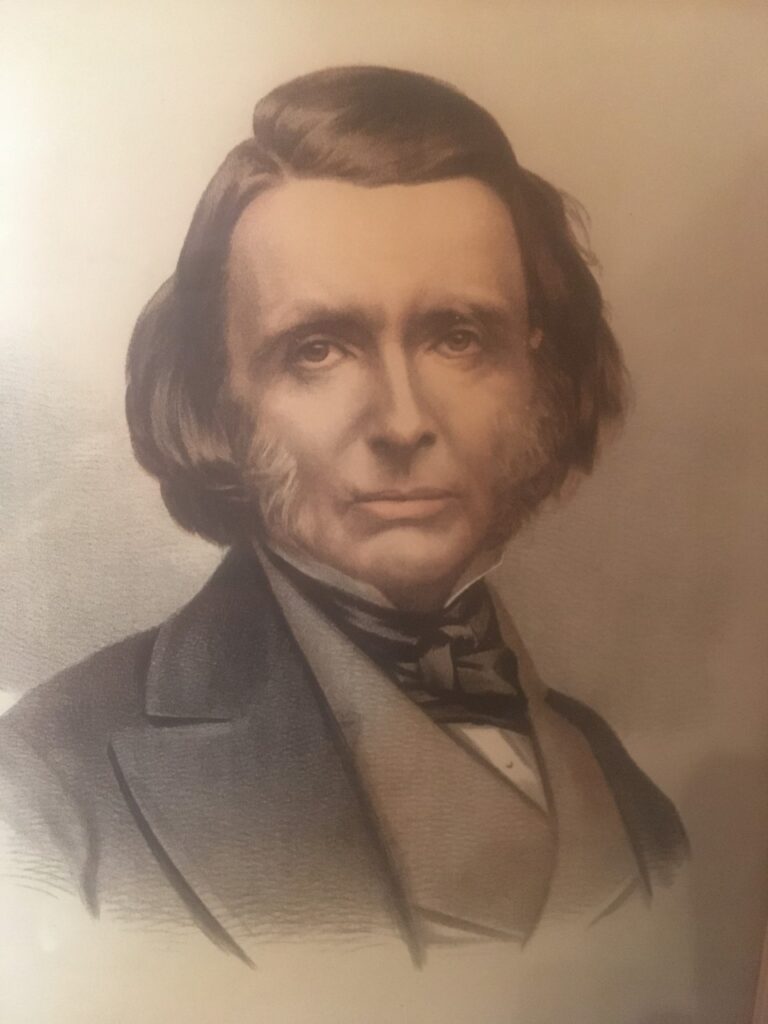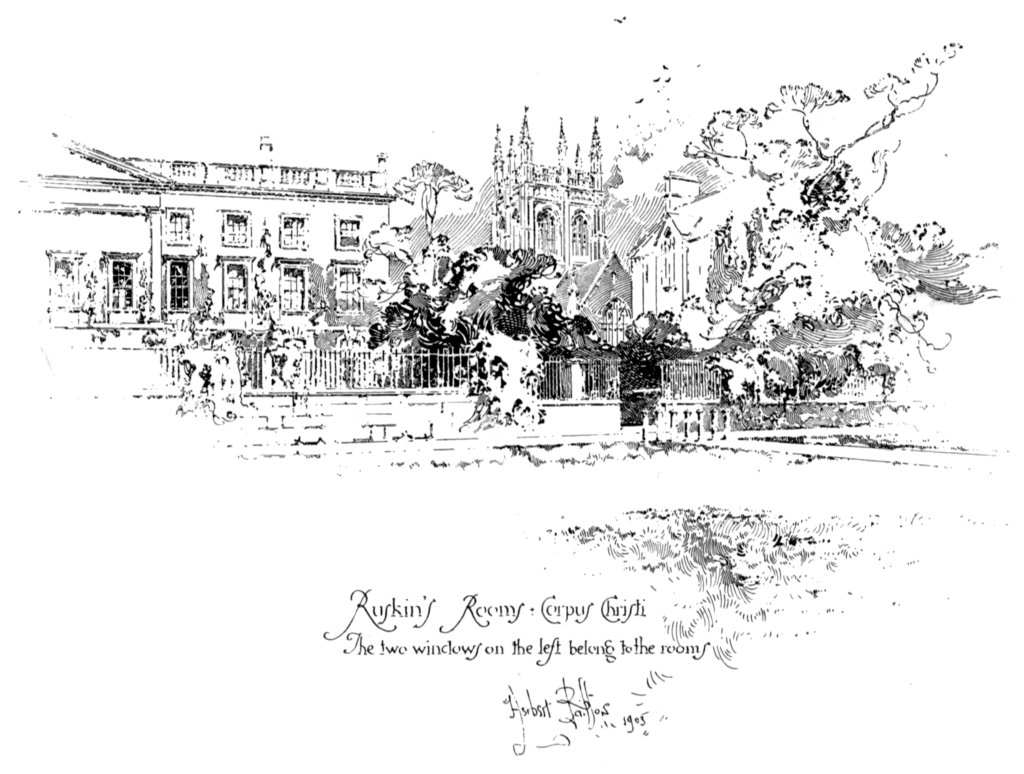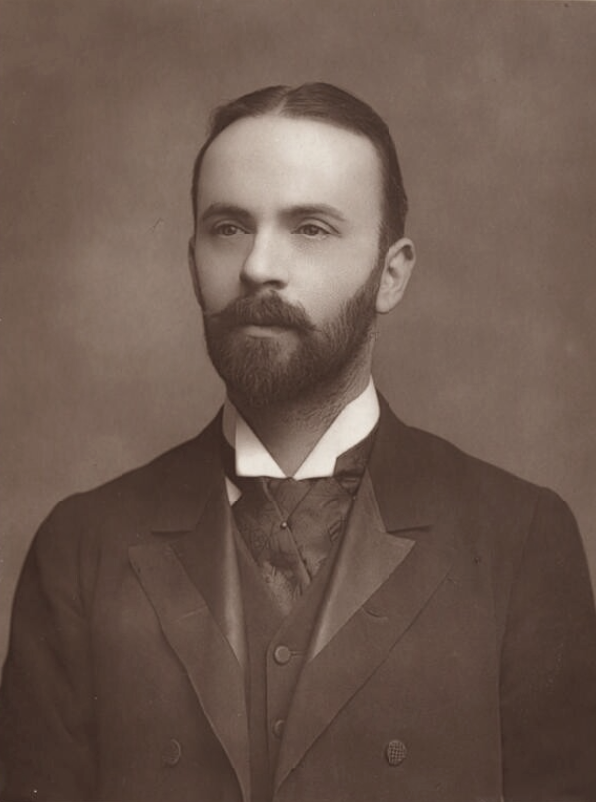As the 203rd anniversary of Ruskin’s birth comes upon us, it seems natural to wonder what Ruskin was really like. We might wish to ask how we would have felt had we met him ourselves? Stuart Eagles explores what Oxford students thought of Ruskin by looking at some accounts of the breakfasts the Hinksey diggers shared with him in his rooms at Corpus Christi College in the mid-1870s.
BREAKFAST WITH RUSKIN
(Part I)

One of the great attractions for the Oxford undergraduates of digging Ruskin’s road at Hinksey was the opportunity it afforded participants to enjoy digger-breakfasts with Ruskin in his rooms at Corpus Christi College. The road-improvement scheme is a subject for a separate blog, and I have referred to it briefly in blog #8, “Ruskin’s Gardener-Angel, David Downs”. (In blog #12, I also recounted some of Michael Sadler’s impressions of “Ruskin as an Oxford Lecturer”.) It was, though, at the Tuesday morning breakfasts held from the Michaelmas (Autumn) Term of 1874, and in 1875, that several of Ruskin’s student-digger disciples got to know their Master best.
The first of the breakfasts occurred on 10 November 1874. The editors of the Library Edition of Ruskin’s Works, E. T. Cook (1857-1919), and Alexander Wedderburn (1854-1931), the latter of whom was one of Ruskin’s Hinksey diggers himself, quote a letter from Ruskin (dated 10 November 1874) addressed to his cousin, Joan Severn, in which he told her, rather tortuously, “I’ve had a nice breakfast of my diggers, and gave the best lecture, everybody says, I ever gave in Oxford. They are wrong; but they ‘know what they like’, and since it pleased them best, I admit that, in a practical sense, it was the best. It wasn’t bad, certainly!” (Works 23.liii.) “Some of the Oxford road-diggers”, Cook and Wedderburn explain, “were attracted to the work, less for its own sake, perhaps, than for the reward of it—the reward of the breakfast-parties and talks in the Professor’s rooms at Corpus; but they had to do the digging first.” (Works 20.xlv.)
One of the most famous descriptions of the breakfasts was supplied in the account given by the campaigning Anglican clergyman and co-founder of the National Trust, Hardwicke Drummond Rawnsley (1851-1920). It appeared in The Atlantic Monthly in April 1900. Though familiar to many Ruskin scholars and admirers, it is worth quoting at length, because it conjures the spirit of such occasions with admirable economy, and leaves a strong impression on the reader of what they meant to the students themselves.
“[…I]t is the memory of the delightful fortnightly breakfasts at Corpus which most abide with one. [According to Collingwood and others, the breakfasts were in fact weekly.] The professor always breakfasted beforehand, in order that he might put himself unreservedly at the service of his young guests; and some one of his trusted attendants was with him, to get this book, or that Turner drawing, or this mineral specimen, or that photograph, to illustrate at a moment’s notice the point under discussion. And the cheeriness of it all! The welcome with both hands outstretched, the sort of enchanting manner in which he made you believe that you were really the dearest friend he had in the world,—as indeed at the time you were. […]
“The personal magic of the Master upon his guests was evidenced by the way in which some of the unlikeliest men in the world fell under its spell, and, to the amazement of their friends, took to digging; this magic was felt in the lecture hall almost as much as in his own breakfast room.
“When one tries to analyze what the power of the teacher was, in those Oxford days, one finds that it consisted in making his hearers believe that he existed only for them, and was entirely their humble servant. The marvelous humility of the man who spat fire at all things mean, and was with Tom Carlyle for God and Queen and Country, one of the doughtiest gladiators of the time,—this it was that impressed us all. But there was also a delightful unconventionality about him, so unlike the stiff and starched method of the ordinary Oxford don.”
W.G. Collingwood (1854-1932) tells us in the third chapter of his Life of John Ruskin that the Master, at these breakfasts,
“was glad of a talk to [the undergraduates] on other things beside drawing and digging. Some were attracted chiefly by the celebrity of the man, or by the curiosity of his humorous discourse; but there were a few who partly grasped one side or other of his mission and character. The most brilliant undergraduate of the time, seen at this breakfast table, but not one of the diggers, was W. H. Mallock [(1849-1923)], afterwards widely known as the author of Is Life Worth Living? [(1879).] He was the only man, Professor Ruskin said, who really understood him—referring to The New Republic [(1876, 1877).] But while Mallock saw the reactionary and pessimistic side of his Oxford teacher, there was a progressist and optimistic side which does not appear in [Mallock’s characterisation of him as] ‘Mr Herbert’. That was discovered by another man whose career, short as it was, proved even more influential. Arnold Toynbee [(1852-1883)] was one of the Professor’s warmest admirers and ablest pupils: and in his philanthropic work [in the East End of London] the teaching of Unto this Last and Fors [Clavigera] was illustrated—not exclusively—but truly. ‘No true disciple of mine will ever be a Ruskinian’ (to quote ‘St Mark’s Rest’); ‘he will follow, not me, but the instincts of his own soul, and the guidance of its Creator’.”
Shards of insight can also be found in private correspondence. T(homas) Herbert Warren (1853-1930), for example, who was President of Magdalen College, Oxford, from 1885 to 1928, wrote to Ruskin in June 1886 about his “memory of the time when I was an undergraduate from 72-76 and used to enjoy the pleasure of breakfasting with you in your rooms at Corpus. […] We in our day heard your voice and enjoyed your personal addresses.” When the centenary of Ruskin’s birth was celebrated in 1919, Warren took the opportunity to explain that it was thanks to Alexander Wedderburn that he went to Ruskin’s breakfasts

“in his fine classical rooms in the Meadow Buildings of Corpus. There the Jowettian scepticism and Balliol confidence followed at any rate some of us. Ruskin wanted to talk of political Economy, we wanted to hear him discourse on art. Brought up on Mill and Ricardo we thought we knew all about ‘the Dull Science’, and we wished to hear of Mantegna and Raphael, and above all, to see his Turners. We did see his Turners, a revelation. Above all we saw him. Gradually it dawned on us that he might be right, that John Stuart Mill, as Disraeli said of his father, was not infallible because he was dull. But it was only later and gradually that I realised the full import of those hours.”
Another undergraduate who had cause to remember what he called “Mr Ruskin’s digger-breakfasts” was Leonard Abraham Montefiore (1853-1879) who, in his short life, practiced as a lawyer. He called these gatherings “feasts”. “After the meal”, he said, Ruskin “would show us his wonderful pictures, and talk with passionate eagerness of Turner’s unmatched skill.” (Leonard Montefiore, Essays and Letters, (1881) p. 312.)
There are a couple of sources that seem never to have been quoted by Ruskin scholars until now. At any rate, if these memories lurk somewhere in the literature, they remain unaccountably obscure. Both help to amplify the accounts given by Rawnsley and others, and provide further evidence of what Ruskin the teacher was like from an Oxford undergraduate’s perspective.
 The first unfamiliar source is A. B. Walkley (1855-1926) (left). Initially admitted to Balliol College, where most of the Hinksey diggers were students, he transferred in 1874 to Ruskin’s college, Corpus. After graduating from Oxford he became a middle-ranking civil servant working in the General Post Office, but he became best known as the theatre critic of The Times, a post he held for 26 years from 1900 to his death in 1926. Writing in the aftermath of Ruskin’s death, Walkley recalled that as a student at Oxford Ruskin had been
The first unfamiliar source is A. B. Walkley (1855-1926) (left). Initially admitted to Balliol College, where most of the Hinksey diggers were students, he transferred in 1874 to Ruskin’s college, Corpus. After graduating from Oxford he became a middle-ranking civil servant working in the General Post Office, but he became best known as the theatre critic of The Times, a post he held for 26 years from 1900 to his death in 1926. Writing in the aftermath of Ruskin’s death, Walkley recalled that as a student at Oxford Ruskin had been
“a gentleman commoner of Christ Church—one of the last of the gentleman commoners, I think—and he never forgot it. He retained the velvet cap and silk gown which distinguished his class—and a velvet cap in my time at Oxford […] was almost as unexpected a sight as a helmet. There was only one other such cap in the Oxford of those days, and that was worn by Prince Leopold. The pair, by the way, were great friends, constantly to be met driving together in the Prince’s little pony phaeton along the Woodstock Road. At the professor’s lectures the Prince—familiarly known among irreverent undergraduates as ‘Luppy’—was a regular attendant. Ruskin had just been appointed Slade Professor, and at the same time an honorary fellow of Corpus, where he occupied rooms in the little garden Quad at the back, looking out on Christ Church meadows, frequently dined ‘in hall’, and gave occasional breakfasts to parties of undergraduates.
“Naturally, his young guests were more than a little afraid of him, but he was the most abordable [i.e. approachable] of men, and (unlike the traditional ghost) was quite willing to speak without being first spoken to. Consequently his breakfasts were much more lively affairs than those given by another famous man of these days—the Master of Balliol. I am still haunted by the terror I felt at one of [Benjamin] Jowett’s breakfasts—four silent undergraduates miserably trifling with the orthodox Oxford baked herrings and ‘squish’, while their host chirruped out little common-places.
“Ruskin in those days wore no beard. The fine, sharp lines of his face were untouched by age. And his costume was a joy to behold—a smart frock coat of light gray, very high at the back of the neck (like Colonel Newcome’s coat in Thackeray’s drawings), with a rolled collar. He wore an old fashioned stock of sky blue satin, which you could see a mile off. All Corpus men took, as it were, a proprietary interest in this remarkable costume; they felt it to be so much a college institution as the Pelican in the Quad [of Corpus]. The famous costume he never varied, at any rate while he was ‘up’ [i.e. in Oxford]. He wore it even when superintending his strange roadmaking experiment in the neighbouring villages [i.e. Hinksey].”
Walkley went on to recall Ruskin’s lectures
“in the theatre of the (then) New Museum [the Oxford Museum of Natural History]; in the afternoons, of course, so as not to interfere with the regular business of the place; and before an audience consisting largely of young ladies. He would pace up and down restlessly as he talked, get the photographs he had brought as illustrations into a hopeless muddle, and finally do without them. That did not matter in the least, for he never by any chance dealt with his announced subject. The theme of the course I attended was supposed to be ‘Early Florentine Art’; and the lecturer certainly did make one or two casual remarks about Cimabue and Giotto. But his diversions were the real thing. With sweeping gestures (he had graceful rhetorical gestures) he declaimed whole passages from the Psalms which were understood to explain, in some way, how the bad weather we were then experiencing was a punishment for the industrial abominations of modern England. Then he would launch into a tirade against our ideals of Gentleman and Lady as illustrated by the latest Mudie novel [i.e. the publisher Charles Edward Mudie (1818-1890), the founder of Mudie’s Lending Library]. And I remember that a Christmas card, popular at the time, representing a buxom young woman in her nightgown clinging to a cross, came in for some particularly violent denunciation. It was all extremely good fun, full of whimsical, almost feminine, exaggeration and antipathies, in the style that we all know; but saved by the kindly half-quizzical smile which those who take the perversities of his books seriously have failed to divine.” (Qtd in the New York Tribune (17 February 1900).
This is a refreshing, lively account of Ruskin at Oxford, affectionate yet not uncritical, revealing in its way, and it deserves, I think, to be better known.
So, too, does the second unfamiliar source to which I gestured earlier. It is an intriguing account of one of Ruskin’s digger-breakfasts at Corpus, and it relates specifically to 8 December 1874. Based on a contemporary diary entry, the account appeared shortly after Ruskin’s death, and was buried in the pages of the Times of India. In common with Walkley’s testimony, it appears to have evaded scholarly attention until now. But it will have to wait till the next blog, so come back soon.
Please send any feedback to contact@stuarteagles.co.uk